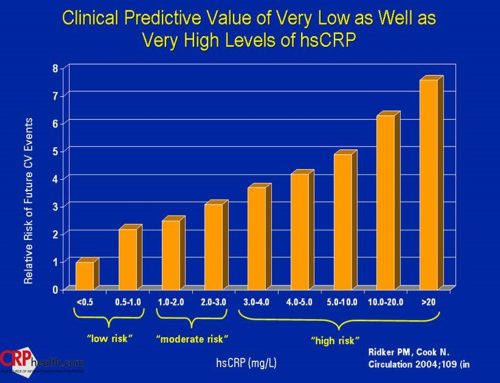How hot are you? The question isn’t about your attractiveness or even body temperature but about systemic inflammation, now believed to be the root cause of chronic diseases.
C-reactive protein (CRP) is a type of protein produced by the liver in response to inflammation in the body. It is a member of the acute-phase proteins, which are part of the body’s immune response to infection, injury, or tissue damage. CRP levels increase rapidly in the bloodstream following the onset of inflammation, making it a valuable biomarker to detect and monitor systemic inflammation.
How does CRP work? CRP plays a role in the body’s immune system by binding to certain types of bacteria and foreign substances. It interacts with damaged cells and activates the complement system, which is a part of the immune response responsible for enhancing inflammation and attracting immune cells to the site of injury or infection. This process helps in the removal of pathogens and promotes tissue repair.
Clinical use of CRP: CRP is widely used in clinical practice as a marker of inflammation, and its measurement is commonly done through a simple blood test. Elevated CRP levels can be indicative of various conditions, such as infections, autoimmune diseases, tissue injury, or chronic inflammatory disorders.
CRP and cardiovascular disease: In addition to its role as a general marker of inflammation, CRP is associated with cardiovascular disease. High levels of CRP in the blood have been linked to an increased risk of heart attacks, strokes, and other cardiovascular events. However, it is important to note that CRP is a marker of inflammation and not a direct cause of heart disease. Elevated CRP levels might reflect ongoing inflammation in the arteries, which can contribute to atherosclerosis (the buildup of plaque in the arteries) and increase the risk of cardiovascular events.
CRP as a risk predictor: CRP testing, along with other risk factors like cholesterol levels, blood pressure, and family history, can help healthcare professionals assess a person’s risk of developing certain diseases, including cardiovascular conditions. It is used in conjunction with other clinical information to provide a more comprehensive assessment of a patient’s health status.
CRP is a valuable tool in medicine, aiding in the diagnosis, monitoring, and risk assessment of various health conditions. However, it’s important to interpret CRP results in the context of the individual’s overall health and medical history, as it can be influenced by a wide range of factors. Consultation with a healthcare professional is essential for proper evaluation and interpretation of CRP levels.
There is a substantial body of research exploring the link between systemic inflammation and chronic diseases. Here are some key studies that provide insights into this association:
Ridker, P. M., Hennekens, C. H., Buring, J. E., & Rifai, N. (2000). C-reactive protein and other markers of inflammation in the prediction of cardiovascular disease in women. New England Journal of Medicine, 342(12), 836-843.
Link: https://www.nejm.org/doi/full/10.1056/NEJM200003233421202
Findings: This study highlights the role of C-reactive protein (CRP), a marker of systemic inflammation, in predicting cardiovascular disease in women.
Pearson, T. A., Mensah, G. A., Alexander, R. W., Anderson, J. L., Cannon, R. O., Criqui, M., … & Vinicor, F. (2003). Markers of inflammation and cardiovascular disease: application to clinical and public health practice: A statement for healthcare professionals from the Centers for Disease Control and Prevention and the American Heart Association. Circulation, 107(3), 499-511.
Link: https://www.ahajournals.org/doi/10.1161/01.CIR.0000052939.59093.45
Findings: This statement discusses various markers of inflammation and their relevance in the context of cardiovascular disease, providing valuable insights into the role of systemic inflammation in heart health.
Hotamisligil, G. S. (2006). Inflammation and metabolic disorders. Nature, 444(7121), 860-867.
Link: https://www.nature.com/articles/nature05485
Findings: This review article delves into the relationship between inflammation and metabolic disorders, shedding light on how chronic inflammation can contribute to conditions like obesity and type 2 diabetes.
Aggarwal, B. B., & Shishodia, S. (2006). Molecular targets of dietary agents for prevention and therapy of cancer. Biochemical Pharmacology, 71(10), 1397-1421.
Link: https://pubmed.ncbi.nlm.nih.gov/16563357/
Findings: This review explores the potential of various dietary agents in modulating inflammatory pathways and their implications in cancer prevention and treatment.
Hunter, C. A., & Jones, S. A. (2015). IL-6 as a keystone cytokine in health and disease. Nature Immunology, 16(5), 448-457.
Link: https://www.nature.com/articles/ni.3153
Findings: This review article discusses the critical role of interleukin-6 (IL-6), an inflammatory cytokine, in both physiological and pathological processes.
Coussens, L. M., & Werb, Z. (2002). Inflammation and cancer. Nature, 420(6917), 860-867.
Link: https://pubmed.ncbi.nlm.nih.gov/12490959/
Findings: This seminal article explores the connection between chronic inflammation and cancer development and progression.
These studies provide evidence supporting the relationship between systemic inflammation and chronic diseases, including cardiovascular disease, metabolic disorders, and cancer. They highlight the importance of understanding and managing chronic inflammation to potentially reduce the risk and severity of these health conditions. Measuring C-reactive protein regularly can tell you how inflamed your body is. Are you too hot?




Leave A Comment
You must be logged in to post a comment.